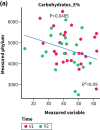A starch- and sucrose-reduced dietary intervention in irritable bowel syndrome patients produced a shift in gut microbiota composition along with changes in phylum, genus, and amplicon sequence variant abundances, without affecting the micro-RNA levels
- PMID: 35484927
- PMCID: PMC9103372
- DOI: 10.1002/ueg2.12227
A starch- and sucrose-reduced dietary intervention in irritable bowel syndrome patients produced a shift in gut microbiota composition along with changes in phylum, genus, and amplicon sequence variant abundances, without affecting the micro-RNA levels
Abstract
Background/aim: A randomized clinical trial with a starch- and sucrose-reduced diet (SSRD) in irritable bowel syndrome (IBS) patients has shown clear improvement of participants' symptoms. The present study aimed to explore the effects of the SSRD on the gut microbiota and circulating micro-RNA in relation to nutrient intake and gastrointestinal symptoms.
Methods: IBS patients were randomized to a 4-week SSRD intervention (n = 80) or control group (n = 25); habitual diet). At baseline and 4 weeks, blood and fecal samples, 4 day-dietary records, and symptom questionnaires were collected, that is, Rome IV questionnaires, IBS-symptom severity score (IBS-SSS) and visual analog scale for IBS (VAS-IBS). Micro-RNA was analyzed in blood and microbiota in faeces by 16S rRNA from regions V1-V2.
Results: The alpha diversity was unaffected, whereas beta diversity was decreased (p < 0.001) along with increased abundance of Proteobacteria (p = 0.0036) and decreased abundance of Bacteroidetes phyla (p < 0.001) in the intervention group at 4 weeks. Few changes were noted in the controls. The shift in beta diversity and phyla abundance correlated with decreased intakes of carbohydrates, disaccharides, and starch and increased fat and protein intakes. Proteobacteria abundance also correlated positively (R2 = 0.07, p = 0.0016), and Bacteroidetes negatively (R2 = 0.07, p = 0.0017), with reduced total IBS-SSS. Specific genera, for example, Eubacterium eligens, Lachnospiraceae UCG-001, Victivallis, and Lachnospira increased significantly in the intervention group (p < 0.001 for all), whereas Marvinbryantia, DTU089 (Ruminoccocaceae family), Enterorhabdus, and Olsenella decreased, together with changes in amplicon sequence variant (ASV) levels. Modest changes of genus and ASV abundance were observed in the control group. No changes were observed in micro-RNA expression in either group.
Conclusion: The SSRD induced a shift in beta diversity along with several bacteria at different levels, associated with changes in nutrient intakes and reduced gastrointestinal symptoms. No corresponding changes were observed in the control group. Neither the nutrient intake nor the microbiota changes affected micro-RNA expression. The study was registered at ClinicalTrials.gov data base (NCT03306381).
Keywords: gastrointestinal symptoms; gut microbiota; irritable bowel syndrome; micro-RNA; starch- and sucrose-reduced diet.
© 2022 The Authors. United European Gastroenterology Journal published by Wiley Periodicals LLC on behalf of United European Gastroenterology.
Conflict of interest statement
There are no competing interests.
Figures








References
-
- Sperber AD, Dumitrascu D, Fukudo S, Gerson C, Ghoshal UC, Gwee KA, et al. The global prevalence of IBS in adults remains elusive due to the heterogeneity of studies: a Rome Foundation working team literature review. Gut. 2017;66(6):1075–1082. - PubMed
-
- Sperber AD, Bangdiwala SI, Drossman DA, Ghoshal UC, Simren M, Tack J, et al. Worldwide prevalence and burden of functional gastrointestinal disorders, results of Rome foundation global study. Gastroenterology. 2021;160(1):99–114. - PubMed
-
- Mitchell H, Porter J, Gibson PR, Barrett J, Garg M. Review article: implementation of a diet low in FODMAPs for patients with irritable bowel syndrome‐directions for future research. Aliment Pharmacol Ther. 2019;49(2):124–39. - PubMed
Publication types
MeSH terms
Substances
Associated data
LinkOut - more resources
Full Text Sources
Medical

